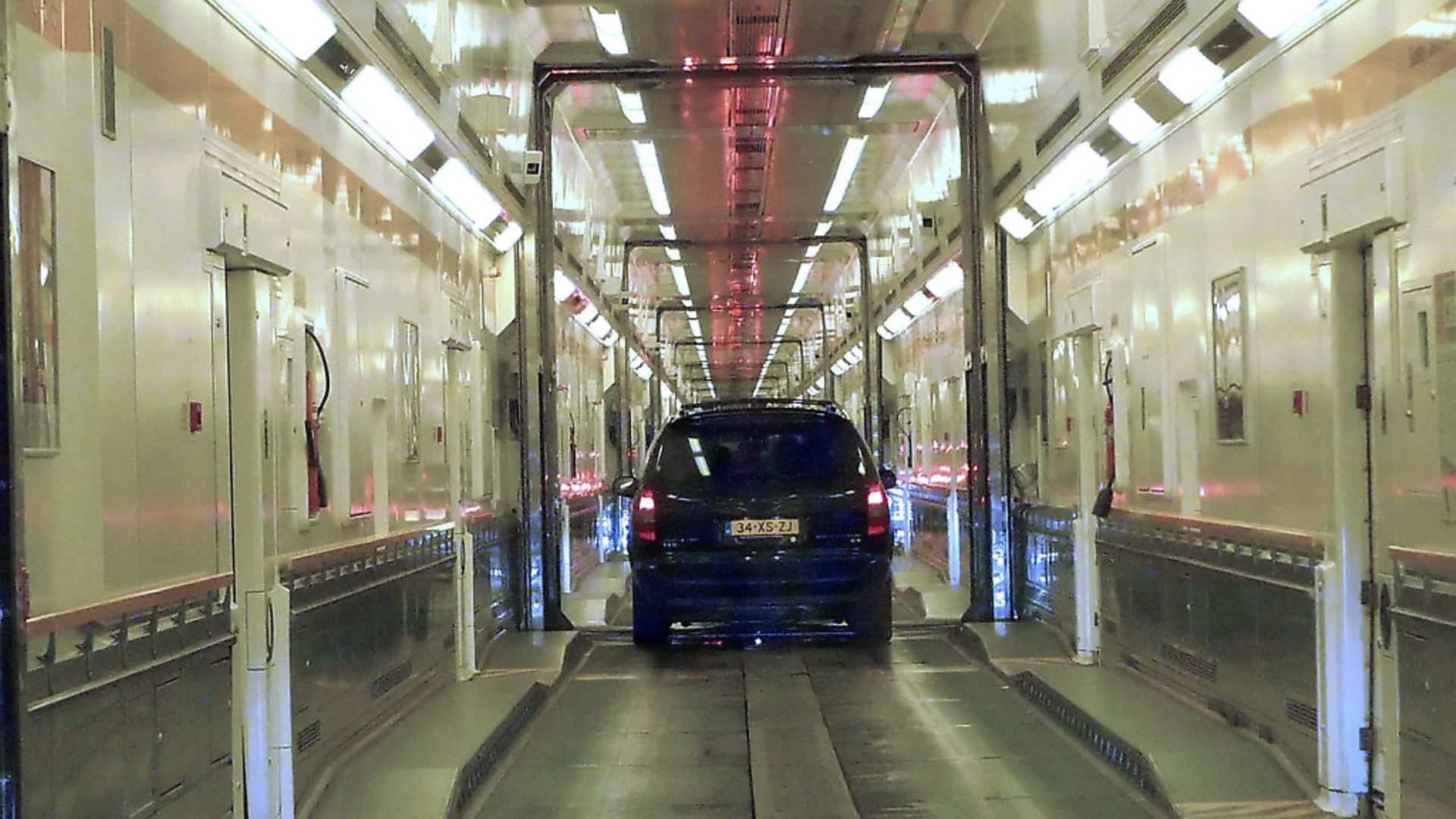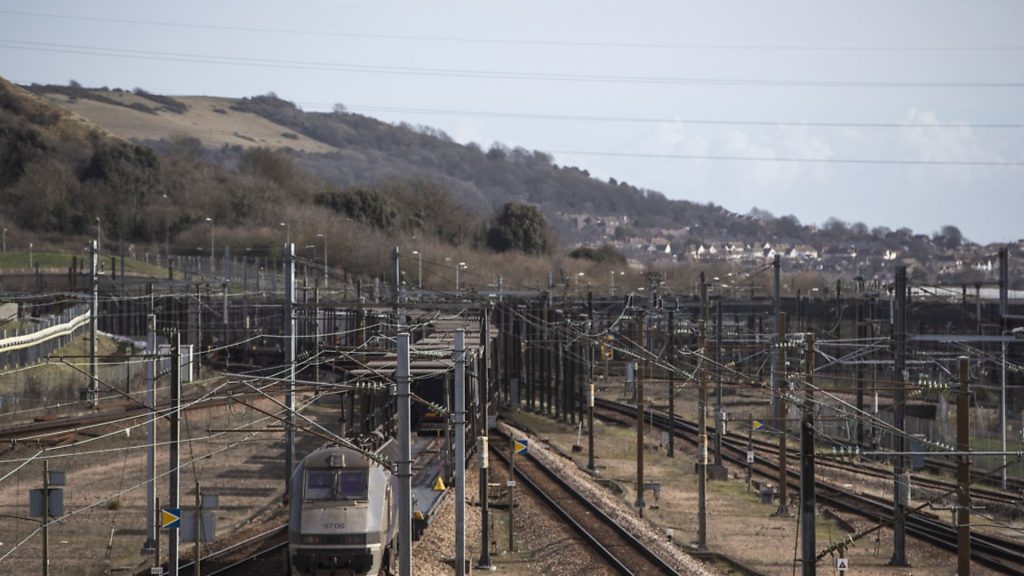
Eurotunnel should offer a quality rail experience. But the reality is far from it, says regular passenger Victor Lewis-Smith.

When a company changes its name, it’s often a desperate attempt to cover up an ongoing PR disaster. Who can forget the Ratner jewellery chain hastily rebranding itself as Signet Group, after its CEO had described its merchandise as “total crap”? Or the Philip Morris tobacco company reincarnating as Altria, after cigarettes had proved to be just a little bit more cancer-friendly than previously thought.
Just over a year ago, Eurotunnel also changed its company title, and is now officially known as Getlink, a name that is a meaningless combination of imperative and vacuity. So what could this latest example of name-change be concealing? As someone who crosses the Channel several times a week, I believe I know the answer. Because, of the three ways to make the crossing, Getlink’s Le Shuttle drive-on railway service is (in my experience) consistently the poorest. The others (which I will cover in the coming weeks) are the Eurostar passenger train to St Pancras, and various boat services.
Back in 1987, thousands of small investors ploughed money into the original company, in return for a promise of cut-price travel thereafter. The proposed tunnels (two main ones and a small service tunnel) were a miracle of design and were duly dug, and the service began operating in 1994, to great acclaim. No longer did a trip from London to Paris or Brussels involve a trip to the airport, or a slow ferry crossing, and the ease of the rail link arguably changed the psycho-geography of Brits and Continentals alike. Transporting large quantities of goods from island to mainland (and vice-versa) became simpler and quicker, creating a win-win situation for manufacturers and entrepreneurs, and the tunnel’s existence surely did far more for Anglo-French relations than any amount of political speeches and EU treaties ever could.
The Achilles’ heel of the Eurotunnel was its finances, because start-up costs massively exceeded expectations, and the operation was initially crippled by ongoing debts, so large that they could realistically never be repaid from annual profits. So in 2007-08, a restructured (and debt-free) company was set up, with investors obliged to trade their old shares for new ones, at a tiny fraction of their original value. To their credit, the company did, at least, become solvent and thriving as a result, and could then invest in rolling stock and renovation. But that was over a decade ago, and I see little sign now of that desire to upgrade and innovate, just a company that’s smugly coasting on its privileged monopoly position as (theoretically) the quickest method for motorists to travel from shore to shore, and making easy profits year after year. Jacques Gounon (who has presided over this complacency for more than a decade) even announced last year that he’d be staying on for several years, well past his retirement age. What a nice little gravy train… sorry gravy shuttle. Chew Chew.
The outdatedness of the company hits you before you even arrive, when you try to make your booking. Unlike Eurostar, there is still no Getlink app, only a train smash of a website that generates an absurd amount of printed ticket paperwork (many pages of which are unnecessary, and are riddled with ads). You’ll then need to type various codes at the pre-barrier machine at Calais, but the antiquated screens are unreadable in strong sunlight, and even when you finally succeed, the barriers can frequently obtain only a desultory semi-erection (okay, we’ve all known that feeling from time to time).
When the barrier does eventually attain full tumescence, you’ll then be allowed to proceed towards customs (although last week the barriers actually came down on my car roof because of the vast queue of cars in front of me). You then head towards giant noticeboards, where useful information is frequently scrambled and arranged in an alphabetical system straight out of the dyslexic’s handbook. Worse, there are no lavatories in this no-man’s (or no-lady’s) land, so although the company boasts about choosing Calais for the continent, it’s a nightmare for the incontinent. I would like to say that they are metaphorically taking the piss, but they are literally not doing so.
To be fair, I have no problems with border controls and customs on either the French or the British side. Despite the chaos that Brexit is generating, they are always polite and efficient, even though their already tough job has now become even tougher. Rather, it is the Eurotunnel staff around them who frequently resemble a cross between Dad’s Army and a Will Hay outfit. At busier times, some of them are brought over from the freight section to deal with regular motorists, and perhaps it’s their habitual dealings with lorry drivers that explains their truck-ulence: I was recently told to “f*** off” by one, simply for asking for clarification about lanes (the evidence was caught on camera, but not so much as an apology came from Getstuffed, sorry Getlink).
The system goes into total meltdown several times each year, usually on Bank Holidays, but M. Gounon and his chums either do not care, or fail to learn from the experience, because the service remains woefully understaffed at those key times. I suspect that, in part, it’s simply because the job is so disagreeable that few people stay there for long. As a regular traveller, I have seldom seen the same face thrice, and the staff seem to vanish faster than Liam Neeson’s film career.
During this ‘waiting around’ period, the prole class are fleeced by outrageously expensive ‘duty free’ deals in the main lounges, while the sad and desperate (myself included, on this occasion) who are willing to pay hundreds more for a Flexiplus business ticket can access the Flexi lounges, where an even fresher madness awaits.
On this recent visit, I entered the nauseating purple interior (rather like walking into a box of Cadbury chocolates), to be greeted by a staff member who informed me (with considerably more glee than was strictly necessary) that there was no phone charger socket available, followed by the phrase “what flavour crisps would you like?” I opted for a mortuary-cold sandwich, and a dismal cake, thinking to myself as I did so, why would anyone want to pay through the nose for access to a lounge when the next train is usually only 20 minutes away? Unless the system breaks down, of course, in which case the lounge rapidly becomes so crowded that it’s unbearable to stay inside it, even in the rain.
If you do decide to stay in the Flexiplus business lounge, don’t expect to find so much as a pipette of alcoholic beverage. They might argue that this is for safety reasons, but that’s absurd, given that it’s on sale in the main building and, anyway, there are thousands of places along the route where alcohol may be bought and consumed by responsible passengers (and irresponsible drivers). To be fair, the Flexiplus ticket also entitles you to get onto the next available train, and to drive into a special check in-lane. But to be fairer, that apparent privilege is utterly pointless, because it merely takes you to the front of the non-flexi lane, where all the other drivers glare at you because they think you’re trying to jump the queue (especially if you sport a UK number plate – good luck there too mate).
More often than not, the journey takes 35 minutes, which is still a bit of a miracle. But the lack of maintenance on arrival in the UK makes for an experience which can be shockingly dangerous. As you drive off the Shuttle, you are directed towards several lines of traffic, but because the painted lines have almost totally faded, confused European motorists (already trying to cope with driving on the other side of the road) frequently become overwhelmed by cognitive dissonance, and desperately perform an impromptu re-enactment of rush hour around the Arc de Triomphe.
How does Getlink survive? Well, in theory, the Eurotunnel crossing is an hour quicker than the much more agreeable ferry, and on a good day that’s the clinching argument for many people. But I know from personal experience that Le Shuttle has many, many bad days, where that time advantage simply vanishes as drivers sit quietly fuming in queues, and are all too likely to arrive at their destination far later than they expected, in a state of infuriated confusion.
Last year, Eurotunnel/Getlink announced record profits, so why can they not train their staff in basic courtesy, or even repaint the roadlines? Or sort out the lavatories? Improve the check-in screen? Or modernise the rolling stock? Like so many companies nowadays, it seems to be run entirely for the benefit of its executives.
As I get older, I don’t seem to get any wiser, but I do increasingly realise the truth of the old saying ‘follow the dollar’. Getlink’s board members are very well remunerated, and if none of them has even noticed that the painted lines in the road have faded, then they presumably prefer to travel via Eurostar, or to fly between Britain and France (if any reader knows precisely how they travel, please let me know). When a business goes bad, it’s the poor sods at the bottom who usually get the blame and the redundancies, but the problem is always at the top. Or as John Webster put it: “Considering duly that a prince’s court/ Is like a common fountain, whence should flow/ Pure silver drops in general, but if ‘t chance / Some curs’d example poison ‘t near the head/ Death and diseases through the whole land spread.”
But even if Getlink was a better managed and more efficient service, there would still be those (on both sides of la Manche) who will remain suspicious of the tunnel’s very existence. Readers of this August newspaper (okay, I know it’s only July, but summer passes so quickly and you may be reading this in delay) are well aware of the many benefits of European integration, and regret the insularity and knee-jerk anti-Europeanism of some Brits; but we should acknowledge that there are also quite a few Continentals who have always doubted the wisdom of making permanent physical connections with the British isles. Indeed, I am reminded of remarks by the 19th century French satirist Alphonse Allais, when the British government first started laying down telegraph cables across the Channel. Allais argued that the cables weren’t really about communications at all; they were really being laid because the government had discovered that Britain was gradually floating westward out to sea, and the cables were needed to moor it to the continent. A century later, when the tunnel was being dug, it seemed to offer the UK an even more solid and permanent connection to Europe. But now, if Brexit finally goes through, and the UK closes its borders, will Eurotunnel survive in the long term? And if not, is there anything to stop Britain drifting geographically – as well as politically, economically, and militarily – ever closer to the US?
Warning: Illegal string offset 'link_id' in /mnt/storage/stage/www/wp-includes/bookmark.php on line 357
Notice: Trying to get property 'link_id' of non-object in /mnt/storage/stage/www/wp-includes/bookmark.php on line 37






